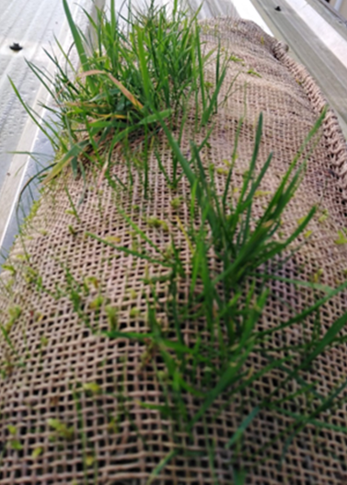
Date: 03 Jun 2022
The Dublin Climate Action Regional Office (CARO) is delighted to partner with UCD Spatial Dynamics Lab, Local Authority and private sector partners on a project to monitor the effectiveness of green roofs for climate action.
The purpose of the project is to investigate the effectiveness of green roofs in reducing stormwater runoff from developments and the extent of flooding.
Extreme rainfall events or ‘cloudbursts’ results in large amount of water falling in a short period of time. In an urban area like a city or large town, much of this rain falls on hard surfaces such as paths and roofs and then enters the drainage network which can become overloaded resulting in flooding. Roofs have the potential to act like sponges in capturing of this rainfall , Nature based solutions like green roofs and roof gardens can use some of this water for plant growth as well as slowing the release of water to the drainage network which has benefits in terms of alleviating flooding.
In this project, experimental green roofs will be measured by AquaRoot's EcoMet, an IoT sensor platform specially designed for environmental monitoring. It will involve the deployment of highly instrumented smart green roofs on the rooftops of several buildings in the greater Dublin area including commercial and local authiority buildings. A wide range of environmental variables such as temperature and humidity will be monitored to provide evidence-based data to assess the performances of green roofs in different urban and meteorological conditions.
The first prototype of this smart green roof was developed as part of the H2020 OPERANDUM project as a result of a collaboration between UCD Spatial Dynamics Lab, Aquaroot and Dogpatch Labs and it was piloted for over a one year on the roof of the CHQ buildings in the Dublin Docklands area.
Novel sustainable growing media such as ‘BioMats’ and ‘MycoMats will also be used to evaluate their ability to absorb and hold rainwater and support plant growth. These materials are made from plant and fungal materials and are designed to be sustainable & end of life biocompostable.
The UCD Spatial Dynamics Lab is doing extensive work in the area of smart and climate neutral cities as part of several projects funded by the European Commission. Francesco Pilla co-director of the lab says;
“Smart technologies integrated with Nature Based solutions such as green roofs will allow us to collect evidence-based data on the performances of such green infrastructure in terms of water retention and flood risk alleviation and to understand how this will perform in different seasons and urban settings. I'm extremely grateful for the support of CARO and the variety of public and private partners on this project which will allow us to deploy and monitor green roofs in various areas in the Great Dublin Area”.
The project will provide data to be used as evidence to guide developments in the Dublin region to implement the Climate Change Action Plans (CCAPs), the National Climate Objective under the Climate Action and Low Carbon Development (Amendment) Act (2021) and the European Green Deal.
Dave Dodd, Coordinator of the Dublin Climate Action Regional Office (CARO) said;
” On behalf of the 4 Dublin Local Authorities, the Dublin CARO is delighted to support this project. Nature Based solutions and Green infrastructure such as green roofs have the potential to offer many benefits including rain water capture, flood alleviation, biodiversity and air quality benefits and reducing the heat island affect. We look forward to working with UCD and the variety of public and private partners on this project and hope that the information and data gained will be useful in assisting us in planning for adaptiing to climate change in our towns and cities”
The project will adopt a ‘living lab’ framework which will focus on real-life setting experimentation and encourage data-sharing and co-development of solutions with a wide range of stakeholders, fostering learning and collaboration with property managers/owners where the test sites are located, namely the Dublin local authorities and the members of the Irish Green Building Council (IGBC).
It is hoped that the final outcome of the project will be a series of recommendations for future replication and widespread use of green roof deployments in the greater Dublin area as an effective and viable solution to reduce storm water runoff from developments and the extent of flooding as well as other environmental and climate benefits.
 For further information on the project please contact Dr. Francesco Pilla: francesco.pilla@ucd.ie
For further information on the project please contact Dr. Francesco Pilla: francesco.pilla@ucd.ie